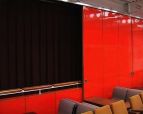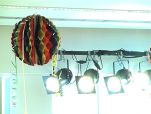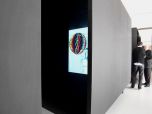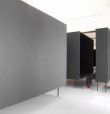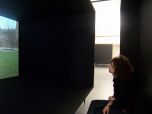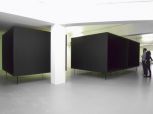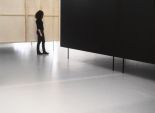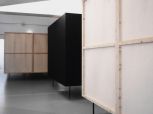<< zurück
Andreas Fogarasi
Kultur und Freizeit
Ausstellungsdauer / Duration of the exhibition
29. Februar bis 03. Mai 2008 / Februar 29 until May 3, 2008
(for english version please scroll down)
Fünf Budapester Kulturzentren und Gemeindehäuser erscheinen als Protagonisten fünf zusammenhängender Videos. In guckkastenartigen Displays werden die einzelnen Sequenzen projiziert. Intim platziert die bühnenhafte Schausituation die Betrachter und Bilder zueinander.
Ruhige, formal an Architekturfotografie angelehnte Kameraeinstellungen oszillieren zwischen sachlichen Details der Raumorganisation und einem visionären Blick, der dem Faktischen ein utopisches Moment unterstellt. Die Bilder liefern eine formale Archäologie der Institutionen. Über visuelle Oberflächen verweist die Arbeit auf ein dahinter liegendes, vielschichtiges Bezugsnetz. Zur Emanzipation der Arbeiter klasse begründet, stehen die Kulturhäuser auch für eine Politik, die die Freizeitgestaltung möglichst stark im kollektiv-öffentlichen Raum ansiedeln und gestalten will. Dieser Zusammenhang macht ein kontrollgesellschaftliches Motiv im Bildungs- und Aufklärungsgedanken sichtbar: Kultur als Erziehung.
So stößt Kultur und Freizeit in die Ambivalenzen und Widersprüche rund um gesellschaftliche Utopien und Projekte ihrer Umsetzung vor. Dabei liest sich die Arbeit mit ihren bewußt offenen Bildern auch als Plädoyer für mehr Komplexität in einer politischen Atmosphäre, die von Vereinfachungen geprägt ist.
Drei Jahre nach seiner ersten institutionellen Einzelausstellung im Grazer Kunstverein (2005) hat Andreas Fogarasi 2007 mit Kultur und Freizeit den Goldenen Löwen der Kunstbiennale von Venedig für den besten Länderpavillon erhalten.
Die Jury lobte die "intelligente und poetische Verbindung" zwischen Inhalt und visueller Sprache, die Fogarasi geschaffen habe. Als ebenso wichtig wird der Zugang des Künstlers zur Modernität, "ihrer Utopien und ihres Scheiterns im Kontext einer geteilten Geschichte" angesehen.
Die Präsentation von Andreas Fogarasis "Kultur und Freizeit" ist die erste Ausstellung der Arbeit nach der Kunstbiennale von Venedig und aufgrund der besonderen Inszenierung (s.o.) eine neue Version des Originals.
Andreas Fogarasi, Jahrgang 1977, lebt in Wien
(english version)
Five cultural and community centres in Budapest are the protagonists of five interrelated videos. Each individual sequence is projected in its own peep-box displays – creating a stage-like viewing situation that results in an intimacy between the images and the beholder.
Calm camera shots with the formal look of architectural photography oscillate between objective details of the spatial organisation and a visionary view that injects a utopian accent into factual reality. The images present a formal archaeology of the institutions. Through the viewed surfaces, the work points to a complex of relationships that lies at the back of them: Founded in order to help emancipate the working classes, these cultural centres also stand for a politics that has tried as strongly as possible to place and shape leisure pursuits within a collective public space. This connection brings to light the element of social control in the prevailing concept of learning and education: culture as training.
In this way, culture and leisure time hit up with the ambivalences and contradictions that surround the social utopias and projects for their realisation. Simultaneously the work, with its deliberately open images, can also be read as a plea for more complexity in a political atmosphere that is marked by simplification.
Three years after his first major solo exhibition at the Grazer Kunstverein (2005), Andreas Fogarasi was awarded the Golden Lion for the Best National Participation at the 2007 Venice Biennale for his video installation "Kultur und Freizeit" (Culture and Leisure Time).
The jury praised the "intelligent and poetic link" that Fogarasi forged between content and visual language. Of equal importance in the jury's eyes was the artist's approach to Modernism, "to its utopias and failures in the context of a shared history".
This presentation of Andreas Fogarasi's "Kultur und Freizeit" will be the first showing of the work since the Biennale in Venice, and as a result of the special staging involved (cf. above) a new variation on the original.
Andreas Fogarasi (*1977) lives in Vienna.
(Transl.: Malcolm Green)
Kurator / curator
Søren Grammel
<< zurück
|

